Nursing Assignment: Application of Roach's 6 C's of Caring in Nursing
VerifiedAdded on 2023/01/17
|7
|1642
|79
Essay
AI Summary
This nursing assignment delves into Simon Roach's 6 C's of Caring, encompassing compassion, commitment, competence, confidence, comportment, and conscience, and their application in nursing practice. The essay explores each aspect, highlighting the importance of compassion in fostering effective communication and culturally safe care, and the role of confidence in decision-making and ethical conduct, as per the NMBA code of conduct. Competency is presented as crucial for evidence-based practices and patient-centered care. The assignment emphasizes how these attributes contribute to a nurse's ability to provide high-quality, secure care while adhering to professional standards. References to relevant literature and NMBA codes further strengthen the analysis, providing a comprehensive understanding of how the 6 C's influence the nursing profession.
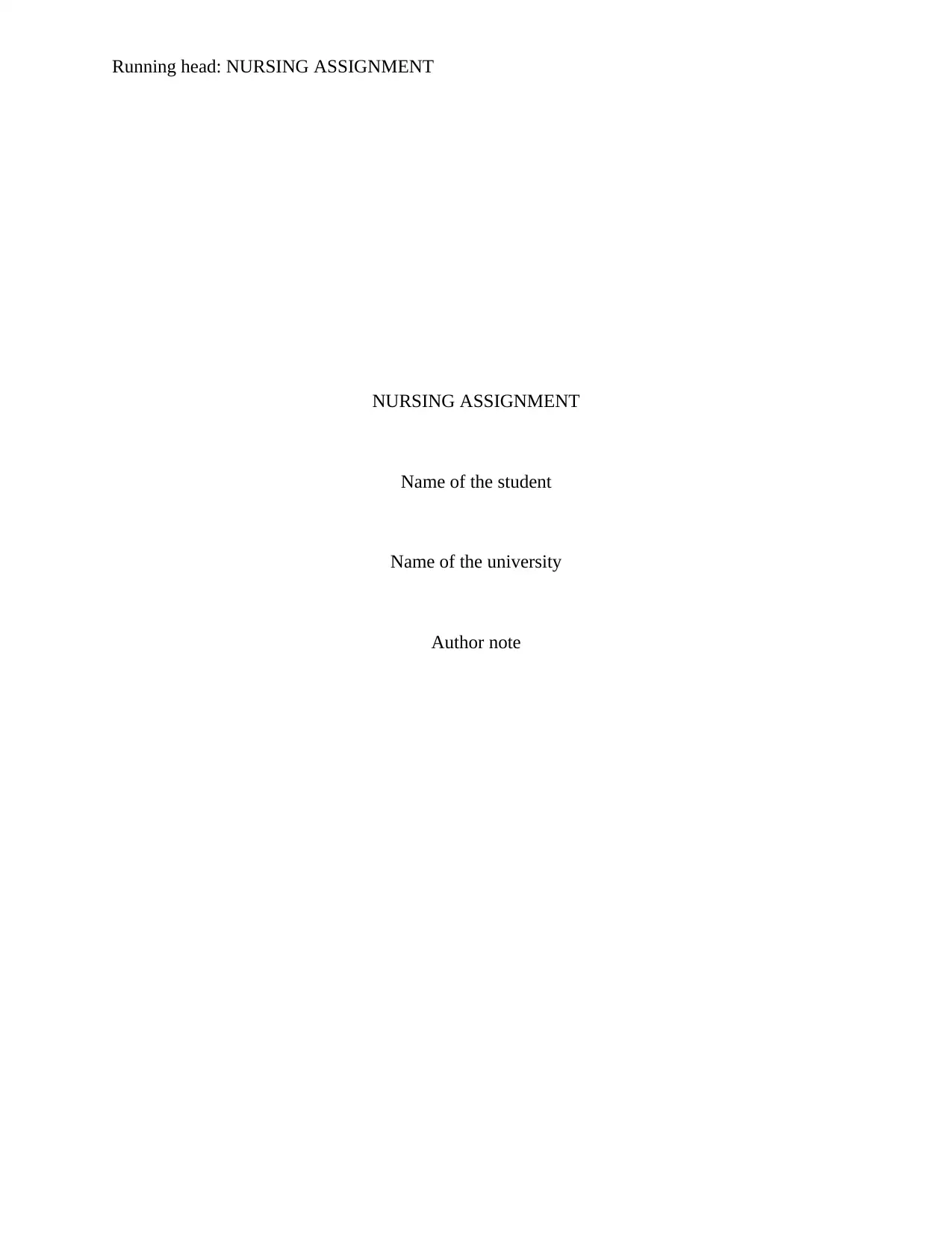
Running head: NURSING ASSIGNMENT
NURSING ASSIGNMENT
Name of the student
Name of the university
Author note
NURSING ASSIGNMENT
Name of the student
Name of the university
Author note
Paraphrase This Document
Need a fresh take? Get an instant paraphrase of this document with our AI Paraphraser
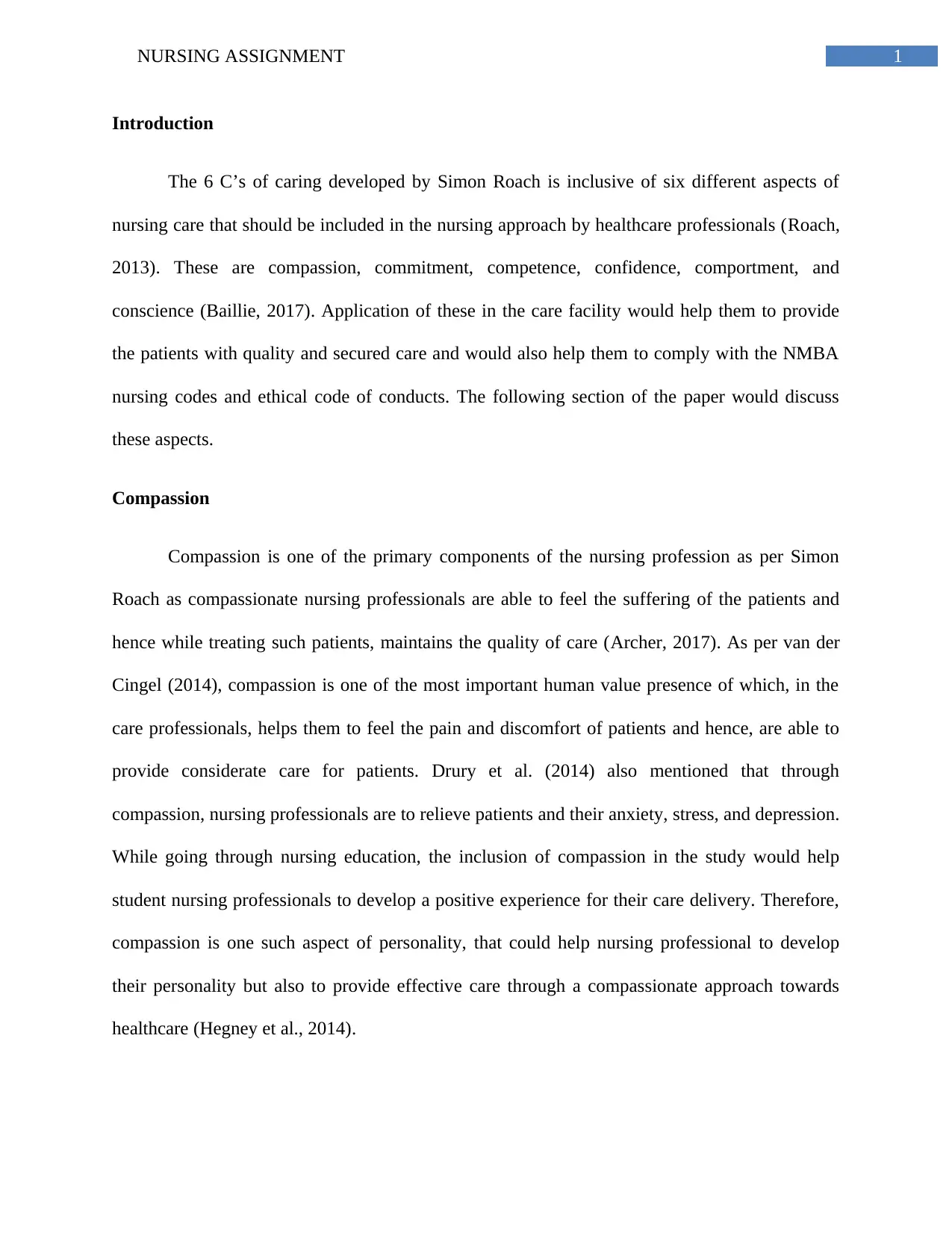
1NURSING ASSIGNMENT
Introduction
The 6 C’s of caring developed by Simon Roach is inclusive of six different aspects of
nursing care that should be included in the nursing approach by healthcare professionals (Roach,
2013). These are compassion, commitment, competence, confidence, comportment, and
conscience (Baillie, 2017). Application of these in the care facility would help them to provide
the patients with quality and secured care and would also help them to comply with the NMBA
nursing codes and ethical code of conducts. The following section of the paper would discuss
these aspects.
Compassion
Compassion is one of the primary components of the nursing profession as per Simon
Roach as compassionate nursing professionals are able to feel the suffering of the patients and
hence while treating such patients, maintains the quality of care (Archer, 2017). As per van der
Cingel (2014), compassion is one of the most important human value presence of which, in the
care professionals, helps them to feel the pain and discomfort of patients and hence, are able to
provide considerate care for patients. Drury et al. (2014) also mentioned that through
compassion, nursing professionals are to relieve patients and their anxiety, stress, and depression.
While going through nursing education, the inclusion of compassion in the study would help
student nursing professionals to develop a positive experience for their care delivery. Therefore,
compassion is one such aspect of personality, that could help nursing professional to develop
their personality but also to provide effective care through a compassionate approach towards
healthcare (Hegney et al., 2014).
Introduction
The 6 C’s of caring developed by Simon Roach is inclusive of six different aspects of
nursing care that should be included in the nursing approach by healthcare professionals (Roach,
2013). These are compassion, commitment, competence, confidence, comportment, and
conscience (Baillie, 2017). Application of these in the care facility would help them to provide
the patients with quality and secured care and would also help them to comply with the NMBA
nursing codes and ethical code of conducts. The following section of the paper would discuss
these aspects.
Compassion
Compassion is one of the primary components of the nursing profession as per Simon
Roach as compassionate nursing professionals are able to feel the suffering of the patients and
hence while treating such patients, maintains the quality of care (Archer, 2017). As per van der
Cingel (2014), compassion is one of the most important human value presence of which, in the
care professionals, helps them to feel the pain and discomfort of patients and hence, are able to
provide considerate care for patients. Drury et al. (2014) also mentioned that through
compassion, nursing professionals are to relieve patients and their anxiety, stress, and depression.
While going through nursing education, the inclusion of compassion in the study would help
student nursing professionals to develop a positive experience for their care delivery. Therefore,
compassion is one such aspect of personality, that could help nursing professional to develop
their personality but also to provide effective care through a compassionate approach towards
healthcare (Hegney et al., 2014).
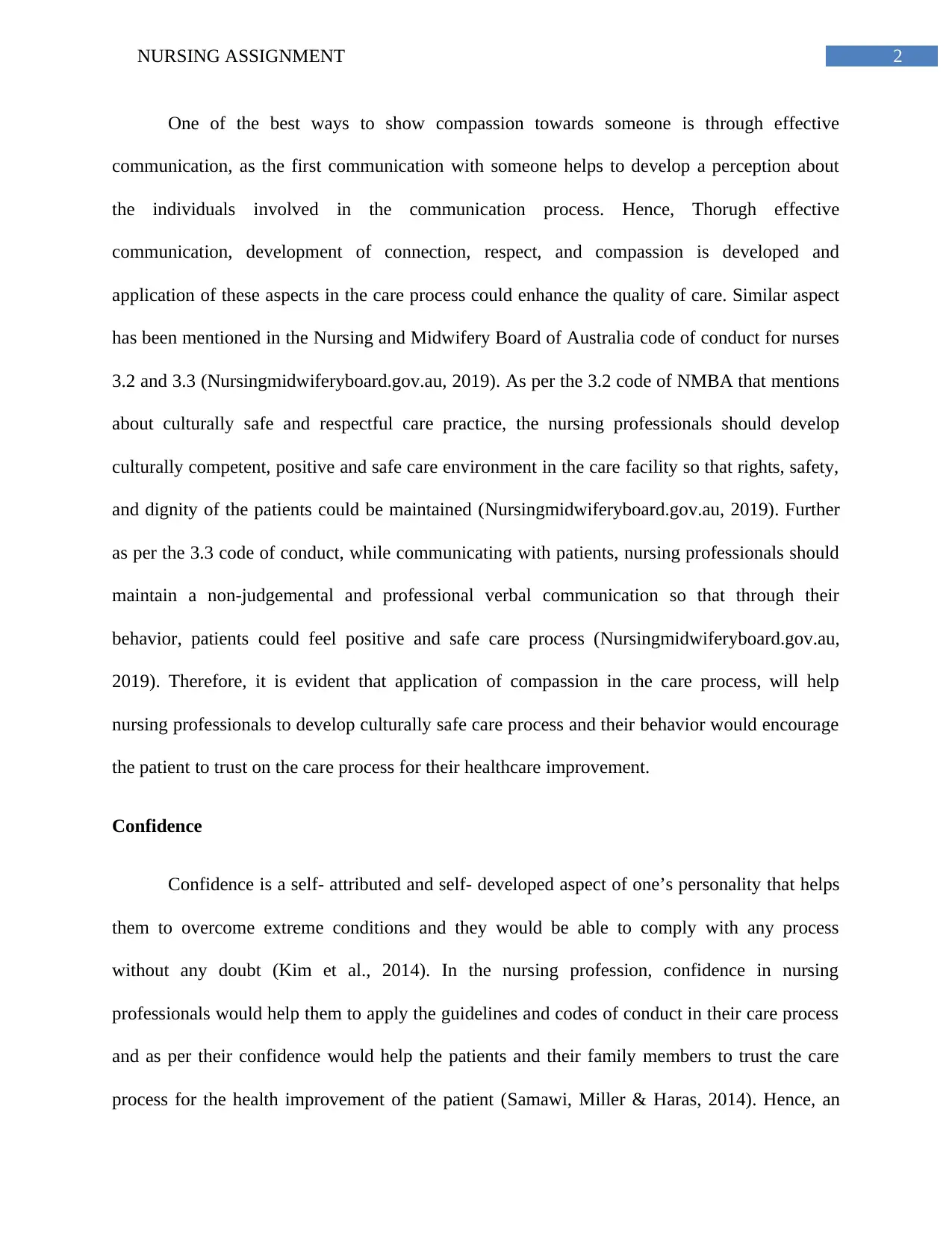
2NURSING ASSIGNMENT
One of the best ways to show compassion towards someone is through effective
communication, as the first communication with someone helps to develop a perception about
the individuals involved in the communication process. Hence, Thorugh effective
communication, development of connection, respect, and compassion is developed and
application of these aspects in the care process could enhance the quality of care. Similar aspect
has been mentioned in the Nursing and Midwifery Board of Australia code of conduct for nurses
3.2 and 3.3 (Nursingmidwiferyboard.gov.au, 2019). As per the 3.2 code of NMBA that mentions
about culturally safe and respectful care practice, the nursing professionals should develop
culturally competent, positive and safe care environment in the care facility so that rights, safety,
and dignity of the patients could be maintained (Nursingmidwiferyboard.gov.au, 2019). Further
as per the 3.3 code of conduct, while communicating with patients, nursing professionals should
maintain a non-judgemental and professional verbal communication so that through their
behavior, patients could feel positive and safe care process (Nursingmidwiferyboard.gov.au,
2019). Therefore, it is evident that application of compassion in the care process, will help
nursing professionals to develop culturally safe care process and their behavior would encourage
the patient to trust on the care process for their healthcare improvement.
Confidence
Confidence is a self- attributed and self- developed aspect of one’s personality that helps
them to overcome extreme conditions and they would be able to comply with any process
without any doubt (Kim et al., 2014). In the nursing profession, confidence in nursing
professionals would help them to apply the guidelines and codes of conduct in their care process
and as per their confidence would help the patients and their family members to trust the care
process for the health improvement of the patient (Samawi, Miller & Haras, 2014). Hence, an
One of the best ways to show compassion towards someone is through effective
communication, as the first communication with someone helps to develop a perception about
the individuals involved in the communication process. Hence, Thorugh effective
communication, development of connection, respect, and compassion is developed and
application of these aspects in the care process could enhance the quality of care. Similar aspect
has been mentioned in the Nursing and Midwifery Board of Australia code of conduct for nurses
3.2 and 3.3 (Nursingmidwiferyboard.gov.au, 2019). As per the 3.2 code of NMBA that mentions
about culturally safe and respectful care practice, the nursing professionals should develop
culturally competent, positive and safe care environment in the care facility so that rights, safety,
and dignity of the patients could be maintained (Nursingmidwiferyboard.gov.au, 2019). Further
as per the 3.3 code of conduct, while communicating with patients, nursing professionals should
maintain a non-judgemental and professional verbal communication so that through their
behavior, patients could feel positive and safe care process (Nursingmidwiferyboard.gov.au,
2019). Therefore, it is evident that application of compassion in the care process, will help
nursing professionals to develop culturally safe care process and their behavior would encourage
the patient to trust on the care process for their healthcare improvement.
Confidence
Confidence is a self- attributed and self- developed aspect of one’s personality that helps
them to overcome extreme conditions and they would be able to comply with any process
without any doubt (Kim et al., 2014). In the nursing profession, confidence in nursing
professionals would help them to apply the guidelines and codes of conduct in their care process
and as per their confidence would help the patients and their family members to trust the care
process for the health improvement of the patient (Samawi, Miller & Haras, 2014). Hence, an
⊘ This is a preview!⊘
Do you want full access?
Subscribe today to unlock all pages.

Trusted by 1+ million students worldwide
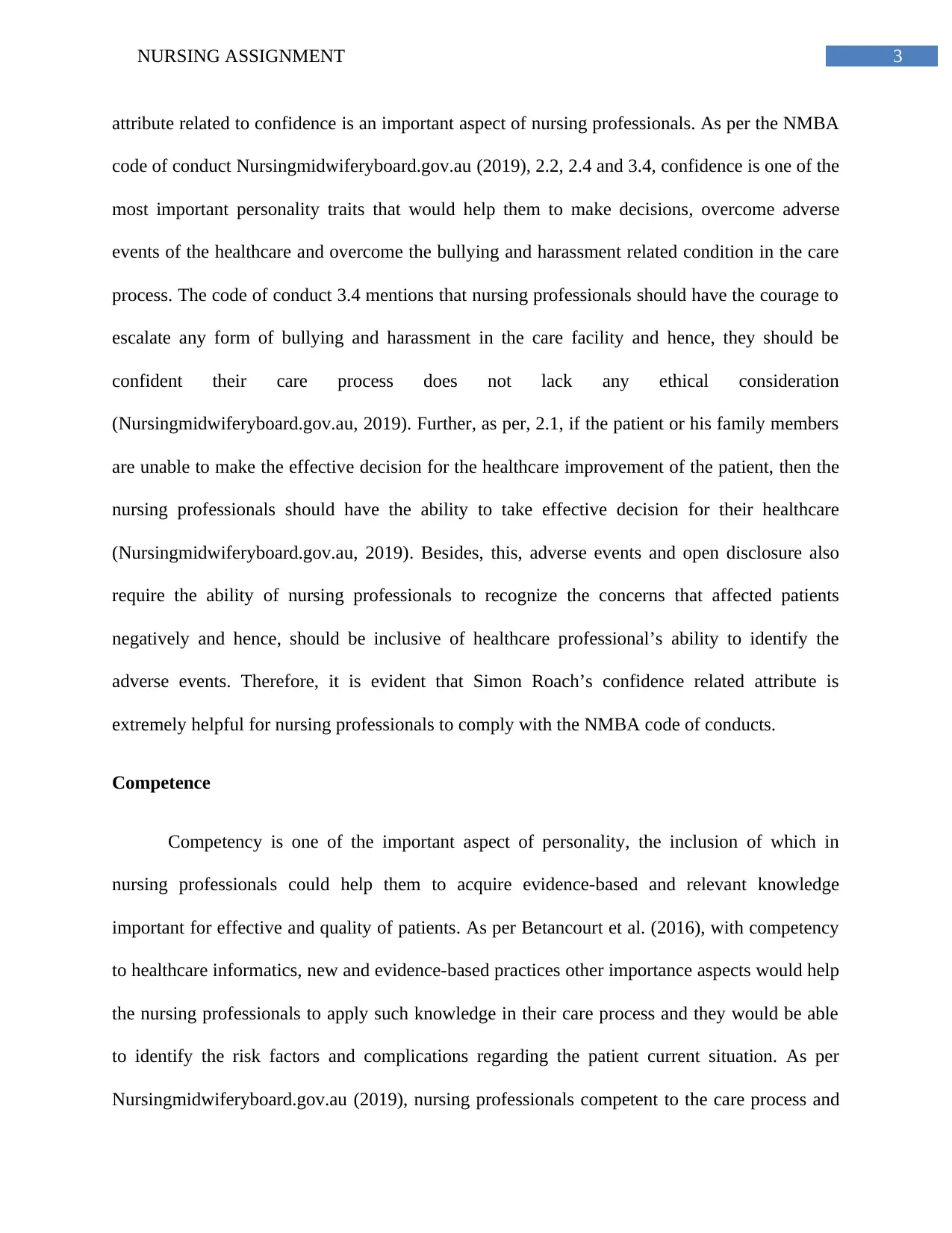
3NURSING ASSIGNMENT
attribute related to confidence is an important aspect of nursing professionals. As per the NMBA
code of conduct Nursingmidwiferyboard.gov.au (2019), 2.2, 2.4 and 3.4, confidence is one of the
most important personality traits that would help them to make decisions, overcome adverse
events of the healthcare and overcome the bullying and harassment related condition in the care
process. The code of conduct 3.4 mentions that nursing professionals should have the courage to
escalate any form of bullying and harassment in the care facility and hence, they should be
confident their care process does not lack any ethical consideration
(Nursingmidwiferyboard.gov.au, 2019). Further, as per, 2.1, if the patient or his family members
are unable to make the effective decision for the healthcare improvement of the patient, then the
nursing professionals should have the ability to take effective decision for their healthcare
(Nursingmidwiferyboard.gov.au, 2019). Besides, this, adverse events and open disclosure also
require the ability of nursing professionals to recognize the concerns that affected patients
negatively and hence, should be inclusive of healthcare professional’s ability to identify the
adverse events. Therefore, it is evident that Simon Roach’s confidence related attribute is
extremely helpful for nursing professionals to comply with the NMBA code of conducts.
Competence
Competency is one of the important aspect of personality, the inclusion of which in
nursing professionals could help them to acquire evidence-based and relevant knowledge
important for effective and quality of patients. As per Betancourt et al. (2016), with competency
to healthcare informatics, new and evidence-based practices other importance aspects would help
the nursing professionals to apply such knowledge in their care process and they would be able
to identify the risk factors and complications regarding the patient current situation. As per
Nursingmidwiferyboard.gov.au (2019), nursing professionals competent to the care process and
attribute related to confidence is an important aspect of nursing professionals. As per the NMBA
code of conduct Nursingmidwiferyboard.gov.au (2019), 2.2, 2.4 and 3.4, confidence is one of the
most important personality traits that would help them to make decisions, overcome adverse
events of the healthcare and overcome the bullying and harassment related condition in the care
process. The code of conduct 3.4 mentions that nursing professionals should have the courage to
escalate any form of bullying and harassment in the care facility and hence, they should be
confident their care process does not lack any ethical consideration
(Nursingmidwiferyboard.gov.au, 2019). Further, as per, 2.1, if the patient or his family members
are unable to make the effective decision for the healthcare improvement of the patient, then the
nursing professionals should have the ability to take effective decision for their healthcare
(Nursingmidwiferyboard.gov.au, 2019). Besides, this, adverse events and open disclosure also
require the ability of nursing professionals to recognize the concerns that affected patients
negatively and hence, should be inclusive of healthcare professional’s ability to identify the
adverse events. Therefore, it is evident that Simon Roach’s confidence related attribute is
extremely helpful for nursing professionals to comply with the NMBA code of conducts.
Competence
Competency is one of the important aspect of personality, the inclusion of which in
nursing professionals could help them to acquire evidence-based and relevant knowledge
important for effective and quality of patients. As per Betancourt et al. (2016), with competency
to healthcare informatics, new and evidence-based practices other importance aspects would help
the nursing professionals to apply such knowledge in their care process and they would be able
to identify the risk factors and complications regarding the patient current situation. As per
Nursingmidwiferyboard.gov.au (2019), nursing professionals competent to the care process and
Paraphrase This Document
Need a fresh take? Get an instant paraphrase of this document with our AI Paraphraser
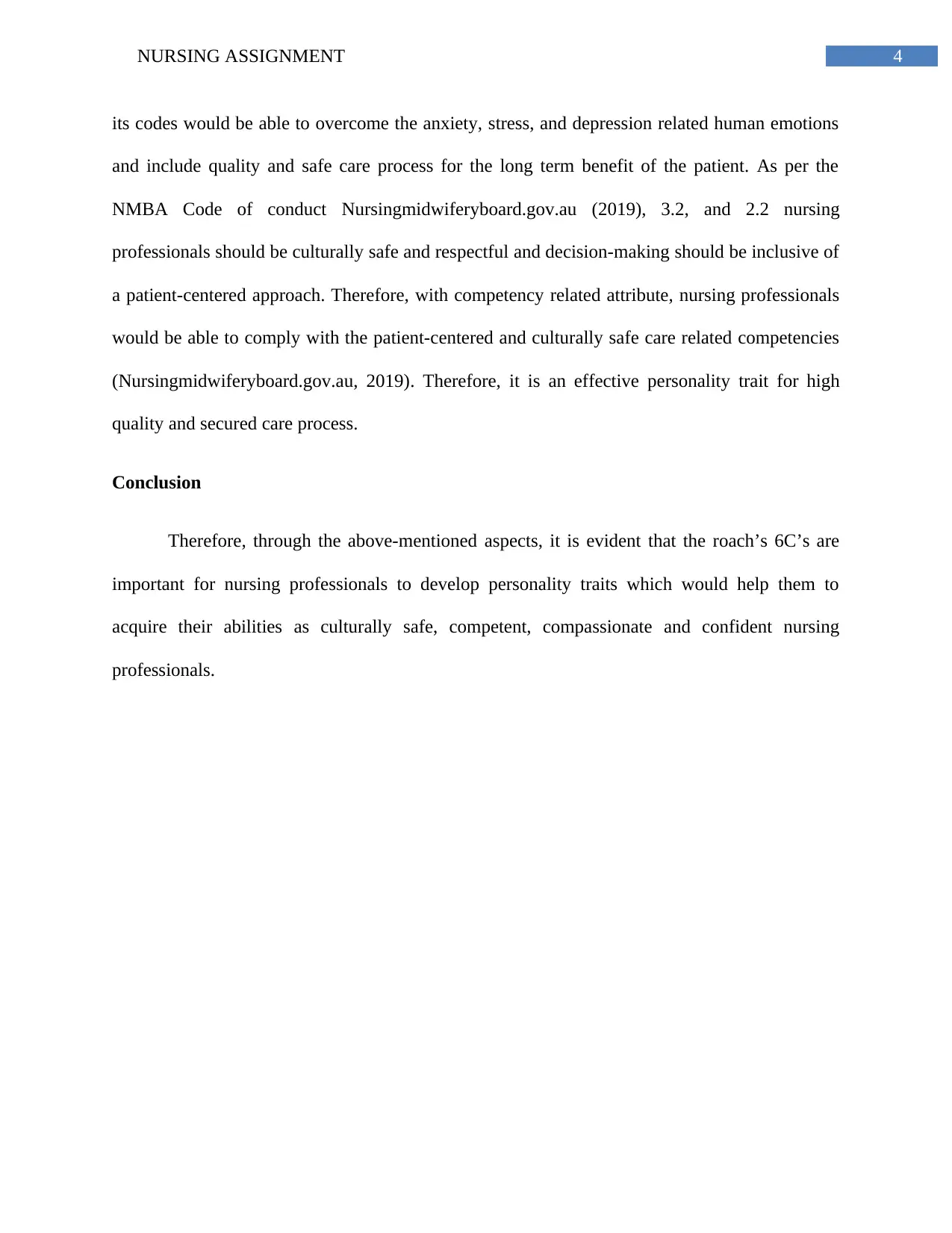
4NURSING ASSIGNMENT
its codes would be able to overcome the anxiety, stress, and depression related human emotions
and include quality and safe care process for the long term benefit of the patient. As per the
NMBA Code of conduct Nursingmidwiferyboard.gov.au (2019), 3.2, and 2.2 nursing
professionals should be culturally safe and respectful and decision-making should be inclusive of
a patient-centered approach. Therefore, with competency related attribute, nursing professionals
would be able to comply with the patient-centered and culturally safe care related competencies
(Nursingmidwiferyboard.gov.au, 2019). Therefore, it is an effective personality trait for high
quality and secured care process.
Conclusion
Therefore, through the above-mentioned aspects, it is evident that the roach’s 6C’s are
important for nursing professionals to develop personality traits which would help them to
acquire their abilities as culturally safe, competent, compassionate and confident nursing
professionals.
its codes would be able to overcome the anxiety, stress, and depression related human emotions
and include quality and safe care process for the long term benefit of the patient. As per the
NMBA Code of conduct Nursingmidwiferyboard.gov.au (2019), 3.2, and 2.2 nursing
professionals should be culturally safe and respectful and decision-making should be inclusive of
a patient-centered approach. Therefore, with competency related attribute, nursing professionals
would be able to comply with the patient-centered and culturally safe care related competencies
(Nursingmidwiferyboard.gov.au, 2019). Therefore, it is an effective personality trait for high
quality and secured care process.
Conclusion
Therefore, through the above-mentioned aspects, it is evident that the roach’s 6C’s are
important for nursing professionals to develop personality traits which would help them to
acquire their abilities as culturally safe, competent, compassionate and confident nursing
professionals.
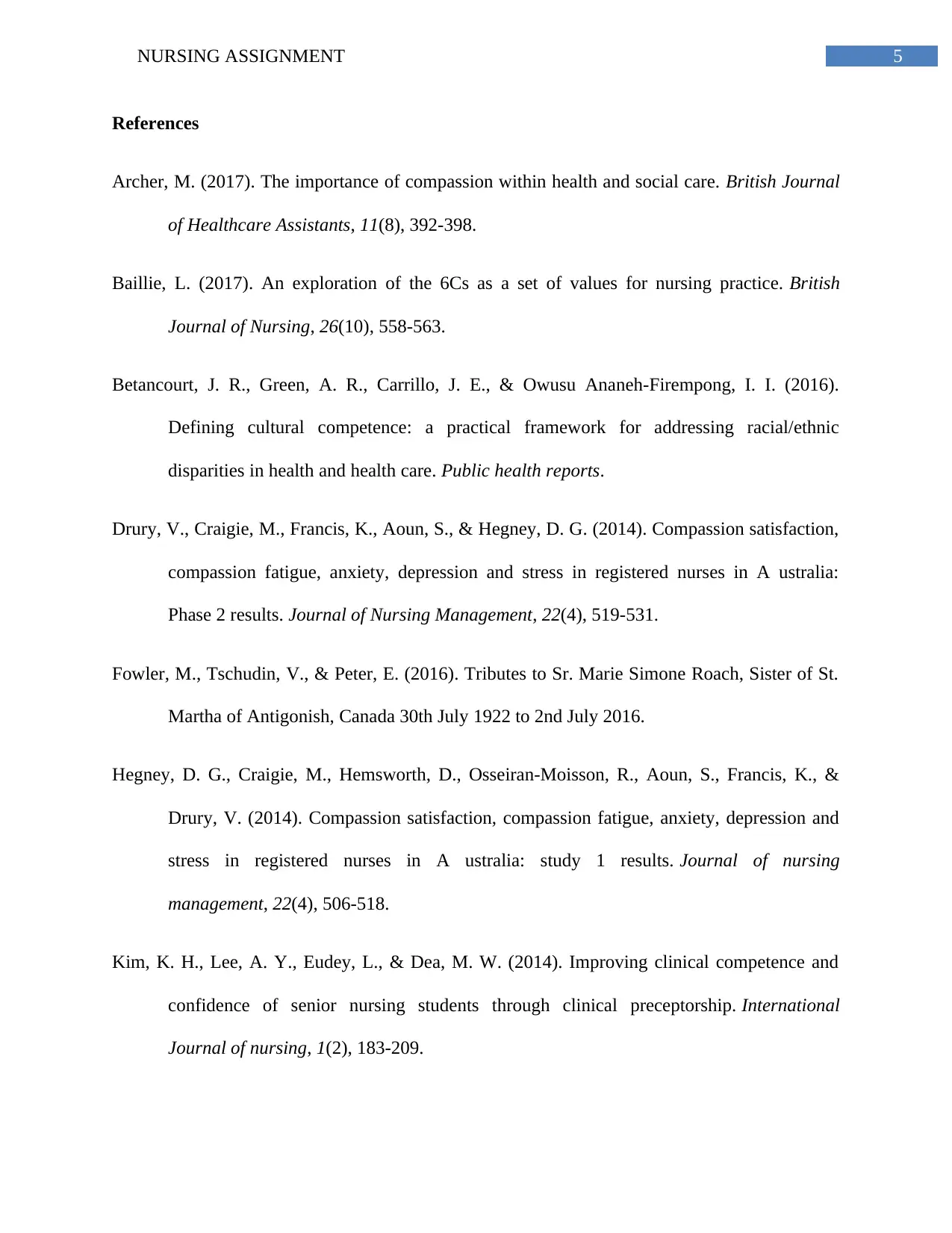
5NURSING ASSIGNMENT
References
Archer, M. (2017). The importance of compassion within health and social care. British Journal
of Healthcare Assistants, 11(8), 392-398.
Baillie, L. (2017). An exploration of the 6Cs as a set of values for nursing practice. British
Journal of Nursing, 26(10), 558-563.
Betancourt, J. R., Green, A. R., Carrillo, J. E., & Owusu Ananeh-Firempong, I. I. (2016).
Defining cultural competence: a practical framework for addressing racial/ethnic
disparities in health and health care. Public health reports.
Drury, V., Craigie, M., Francis, K., Aoun, S., & Hegney, D. G. (2014). Compassion satisfaction,
compassion fatigue, anxiety, depression and stress in registered nurses in A ustralia:
Phase 2 results. Journal of Nursing Management, 22(4), 519-531.
Fowler, M., Tschudin, V., & Peter, E. (2016). Tributes to Sr. Marie Simone Roach, Sister of St.
Martha of Antigonish, Canada 30th July 1922 to 2nd July 2016.
Hegney, D. G., Craigie, M., Hemsworth, D., Osseiran‐Moisson, R., Aoun, S., Francis, K., &
Drury, V. (2014). Compassion satisfaction, compassion fatigue, anxiety, depression and
stress in registered nurses in A ustralia: study 1 results. Journal of nursing
management, 22(4), 506-518.
Kim, K. H., Lee, A. Y., Eudey, L., & Dea, M. W. (2014). Improving clinical competence and
confidence of senior nursing students through clinical preceptorship. International
Journal of nursing, 1(2), 183-209.
References
Archer, M. (2017). The importance of compassion within health and social care. British Journal
of Healthcare Assistants, 11(8), 392-398.
Baillie, L. (2017). An exploration of the 6Cs as a set of values for nursing practice. British
Journal of Nursing, 26(10), 558-563.
Betancourt, J. R., Green, A. R., Carrillo, J. E., & Owusu Ananeh-Firempong, I. I. (2016).
Defining cultural competence: a practical framework for addressing racial/ethnic
disparities in health and health care. Public health reports.
Drury, V., Craigie, M., Francis, K., Aoun, S., & Hegney, D. G. (2014). Compassion satisfaction,
compassion fatigue, anxiety, depression and stress in registered nurses in A ustralia:
Phase 2 results. Journal of Nursing Management, 22(4), 519-531.
Fowler, M., Tschudin, V., & Peter, E. (2016). Tributes to Sr. Marie Simone Roach, Sister of St.
Martha of Antigonish, Canada 30th July 1922 to 2nd July 2016.
Hegney, D. G., Craigie, M., Hemsworth, D., Osseiran‐Moisson, R., Aoun, S., Francis, K., &
Drury, V. (2014). Compassion satisfaction, compassion fatigue, anxiety, depression and
stress in registered nurses in A ustralia: study 1 results. Journal of nursing
management, 22(4), 506-518.
Kim, K. H., Lee, A. Y., Eudey, L., & Dea, M. W. (2014). Improving clinical competence and
confidence of senior nursing students through clinical preceptorship. International
Journal of nursing, 1(2), 183-209.
⊘ This is a preview!⊘
Do you want full access?
Subscribe today to unlock all pages.

Trusted by 1+ million students worldwide
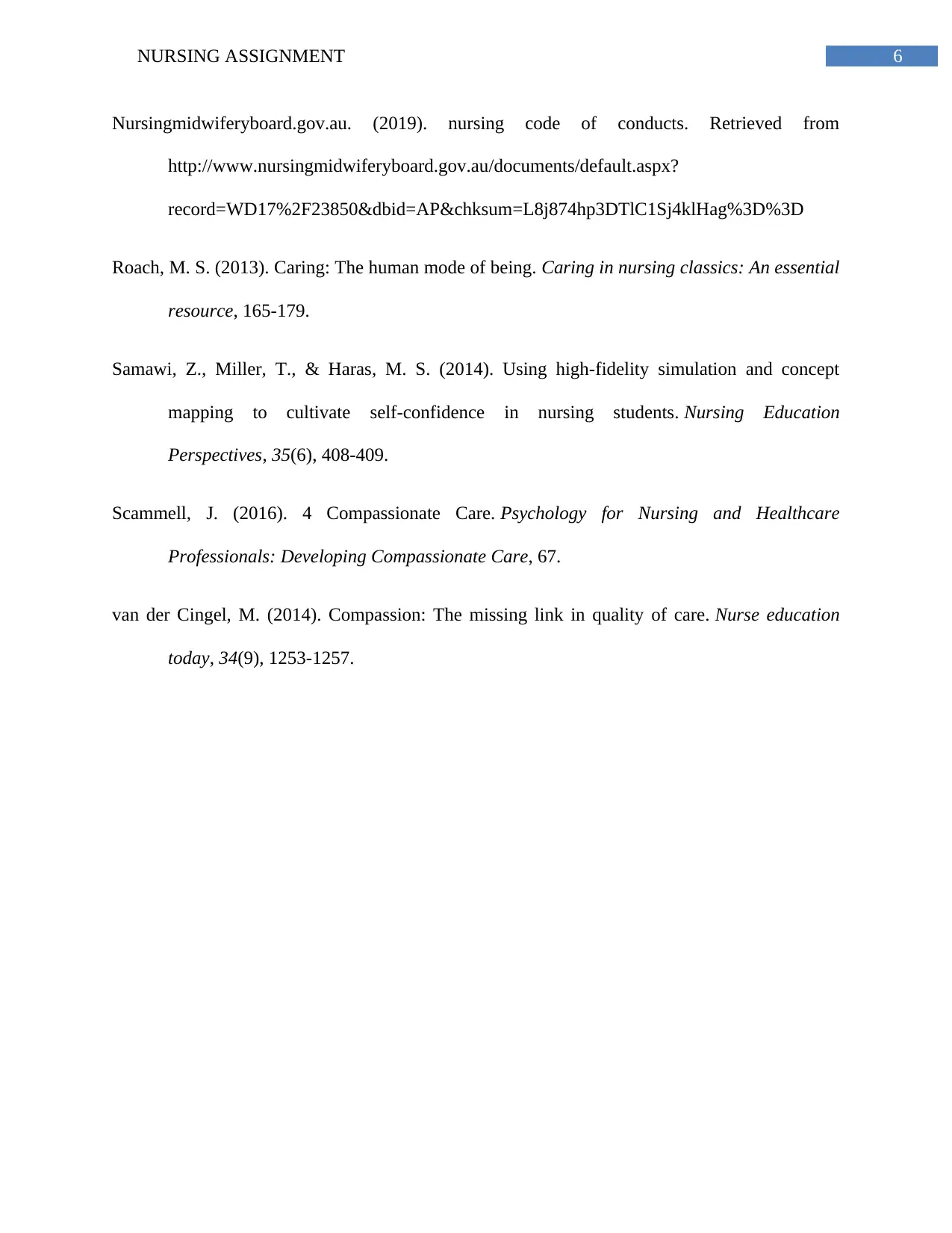
6NURSING ASSIGNMENT
Nursingmidwiferyboard.gov.au. (2019). nursing code of conducts. Retrieved from
http://www.nursingmidwiferyboard.gov.au/documents/default.aspx?
record=WD17%2F23850&dbid=AP&chksum=L8j874hp3DTlC1Sj4klHag%3D%3D
Roach, M. S. (2013). Caring: The human mode of being. Caring in nursing classics: An essential
resource, 165-179.
Samawi, Z., Miller, T., & Haras, M. S. (2014). Using high-fidelity simulation and concept
mapping to cultivate self-confidence in nursing students. Nursing Education
Perspectives, 35(6), 408-409.
Scammell, J. (2016). 4 Compassionate Care. Psychology for Nursing and Healthcare
Professionals: Developing Compassionate Care, 67.
van der Cingel, M. (2014). Compassion: The missing link in quality of care. Nurse education
today, 34(9), 1253-1257.
Nursingmidwiferyboard.gov.au. (2019). nursing code of conducts. Retrieved from
http://www.nursingmidwiferyboard.gov.au/documents/default.aspx?
record=WD17%2F23850&dbid=AP&chksum=L8j874hp3DTlC1Sj4klHag%3D%3D
Roach, M. S. (2013). Caring: The human mode of being. Caring in nursing classics: An essential
resource, 165-179.
Samawi, Z., Miller, T., & Haras, M. S. (2014). Using high-fidelity simulation and concept
mapping to cultivate self-confidence in nursing students. Nursing Education
Perspectives, 35(6), 408-409.
Scammell, J. (2016). 4 Compassionate Care. Psychology for Nursing and Healthcare
Professionals: Developing Compassionate Care, 67.
van der Cingel, M. (2014). Compassion: The missing link in quality of care. Nurse education
today, 34(9), 1253-1257.
1 out of 7
Related Documents
Your All-in-One AI-Powered Toolkit for Academic Success.
+13062052269
info@desklib.com
Available 24*7 on WhatsApp / Email
![[object Object]](/_next/static/media/star-bottom.7253800d.svg)
Unlock your academic potential
Copyright © 2020–2026 A2Z Services. All Rights Reserved. Developed and managed by ZUCOL.





